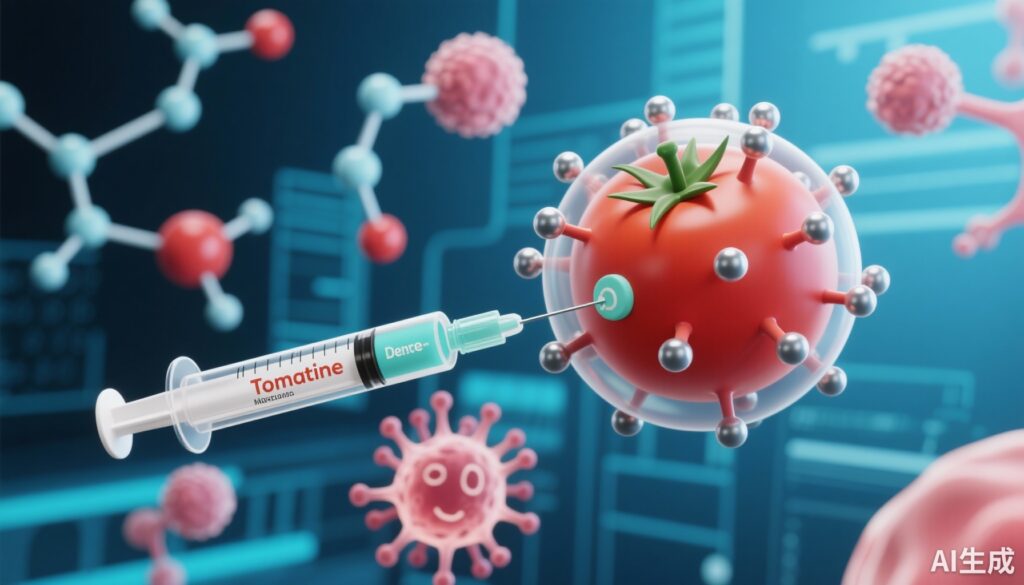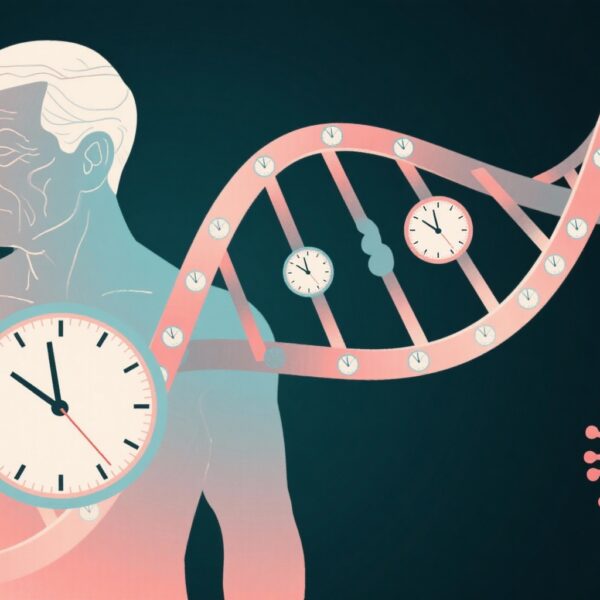Highlight
– Tomatine, a natural product, acts as a multifunctional adjuvant enhancing mRNA vaccine uptake and antigen expression.
– Tomatine-based liposomes (T-LPX) increase dendritic cell uptake via caveolin-mediated endocytosis and boost mRNA translation through upregulation of DExH-box helicase 29.
– Tomatine activates the NOD-like receptor pathway, promoting IFN-γ secretion and upregulation of co-stimulatory molecules CD80 and CD86 in dendritic cells.
– Tomatine-enhanced mRNA vaccines demonstrate potent antitumor activity in murine models and durable humoral and cellular immunity against SARS-CoV-2.
– The versatile adjuvant effect of tomatine extends across different nanocarriers and antigens, indicating broad translational potential.
Study Background
Messenger RNA (mRNA) vaccines have rapidly emerged as a transformative platform in immunotherapy and infectious disease prevention. Their ability to elicit potent adaptive immune responses hinges on effective intracellular delivery of mRNA, efficient translation into antigenic proteins, and robust activation of innate immunity that shapes downstream adaptive responses. Despite recent successes, including SARS-CoV-2 vaccines, enhancing antigen expression and innate immune activation through simple, biocompatible adjuvants remains a challenging frontier.
Tomatine—a glycoalkaloid natural compound derived from tomatoes—possesses inherent bioactivity and immunomodulatory properties. However, its role in mRNA vaccine platforms has not been clearly elucidated. This study by Xiao et al. sought to investigate whether tomatine could serve as a multifunctional adjuvant to simultaneously enhance mRNA translation and innate immune activation, thereby boosting vaccine efficacy in both cancer immunotherapy and infectious disease contexts.
Study Design
This experimental study incorporated tomatine into widely used nanocarriers—liposomes (forming T-LPX) and lipid nanoparticles (LNPs)—to deliver mRNA encoding tumor antigens or SARS-CoV-2 proteins. Key in vitro assessments included uptake studies in dendritic cells (DCs), evaluation of mRNA translation efficiency, and profiling of innate immune activation pathways. In vivo efficacy was assessed in murine models of tumor (E.G7-OVA lymphoma) and SARS-CoV-2 vaccination, focusing on immunogenicity and antitumor or antiviral responses.
Mechanistic analyses investigated endocytic pathways mediating mRNA carrier uptake, modulation of RNA helicases involved in translation, and innate immune receptor activation, particularly nucleotide-binding oligomerization domain (NOD)-like receptors (NLRs). Key immune activation markers included interferon-γ (IFN-γ) secretion and expression of co-stimulatory molecules CD80 and CD86 on DCs.
Key Findings
Enhanced Uptake and mRNA Translation: Tomatine incorporation into liposomes produced T-LPX particles that demonstrated significantly increased uptake by dendritic cells. This uptake was mediated through caveolin-dependent endocytosis, a pathway facilitating efficient intracellular delivery. Tomatine also upregulated the expression of DExH-box helicase 29 (DHX29), a host RNA helicase known to enhance mRNA translation, resulting in markedly increased expression of encoded antigens from mRNA cargos.
Innate Immune Activation: Tomatine robustly activated the NOD-like receptor signaling pathway within DCs. This activation induced a pro-inflammatory milieu characterized by elevated secretion of IFN-γ and increased surface expression of CD80 and CD86, critical co-stimulatory molecules that prime T-cell responses. The dual effects on translation and innate signaling synergistically amplified antigen presentation efficiency.
Antitumor Efficacy: When loaded with tumor antigen-encoding mRNA, T-LPX elicited potent adaptive immune responses in E.G7-OVA tumor-bearing mice, leading to significant tumor growth inhibition. These results underscore the potential utility of tomatine-adjuvanted mRNA vaccines in cancer immunotherapy by improving both antigen expression and immune activation.
Application to Infectious Disease Vaccination: The adjuvant effect of tomatine extended beyond liposomes to LNP formulations and was applicable with different antigens. A LNP-based mRNA vaccine against SARS-CoV-2 incorporating tomatine induced durable humoral and cellular immunity, suggesting broad potential in infectious disease immunization strategies.
Safety and Translational Potential: Although detailed safety data were not highlighted, the use of naturally derived tomatine provides a favorable biocompatibility profile alongside enhanced immunogenicity. The study’s demonstration of cross-platform efficacy with different nanocarriers enhances translational relevance for clinical mRNA vaccine development.
Expert Commentary
The findings by Xiao et al. represent a meaningful advance in mRNA vaccine adjuvant research by identifying tomatine as a natural, multifunctional enhancer capable of boosting both antigen expression and innate immune activation. The dual mechanism—augmenting intracellular mRNA translation through DHX29 upregulation and stimulating NOD-like receptor pathways—provides biological plausibility for the superior adaptive immune responses observed.
This study addresses a critical challenge in mRNA vaccine design: optimizing innate immune engagement without compromising translation efficiency. Traditional adjuvants may induce inflammation but sometimes inhibit mRNA translation. Tomatine’s ability to simultaneously enhance both aspects positions it as a promising candidate adjuvant with a strong mechanistic foundation.
Limitations include incomplete exploration of long-term safety and potential immunopathology associated with sustained NLR activation. Additionally, while murine models provide proof of concept, further validation in human immune cells and clinical trials is essential to establish clinical applicability.
Conclusion
Tomatine emerges from this study as a versatile natural adjuvant that significantly boosts the efficacy of mRNA vaccines by improving cellular uptake, enhancing mRNA translation, and activating innate immunity. Its demonstrated utility in tumor models and SARS-CoV-2 vaccination outlines a broad potential for applications in cancer immunotherapy and infectious disease prevention. Future research should aim to elucidate safety profiles in humans and explore clinical translation opportunities.
Funding and Clinical Trials
The original study did not specify funding sources or clinical trial registrations. Further clinical development will require rigorous safety assessment and potential trial design to test tomatine-adjuvanted mRNA vaccines in humans.
References
1. Xiao W, Qin S, Li X, et al. Tomatine as a versatile adjuvant boosts mRNA vaccine responses. Mater Today Bio. 2025 Sep 27;35:102360. doi:10.1016/j.mtbio.2025.102360. PMID: 41089727; PMCID: PMC12517100.
2. Pardi N, Hogan MJ, Porter FW, Weissman D. mRNA vaccines—a new era in vaccinology. Nat Rev Drug Discov. 2018 Apr;17(4):261-279.
3. Glover DJ, Lipps HJ, Jans DA. Towards safe, non-viral therapeutic gene expression in humans. Nat Rev Genet. 2017 Jul;18(6): 421-434.
4. Iwasaki A, Medzhitov R. Control of adaptive immunity by the innate immune system. Nat Immunol. 2015 Apr;16(4):343-53.



